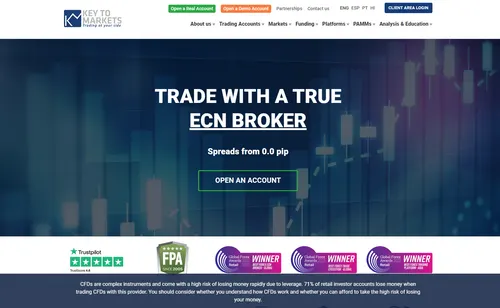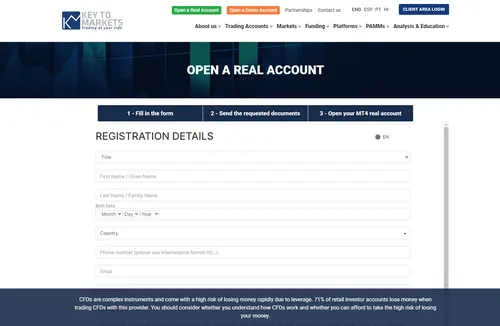Key to Markets offers financial services to its clients globally. The broker is authorized and regulated by the FSC and FCA. What’s great about this broker is that it offers both spread-free and commission-free account types.
Key to Markets has won various international awards from Global Forex Awards, including:
- Best Forex ECN Broker in 2021 and 2022 – Global
- Best Forex trade execution, 2021 – Global
- Best Forex trading platform, 2022 – Asia
With Key to Markets, you can trade Forex, commodities, indices, cryptocurrencies, and shares as CFDs. However, it’s worth mentioning that the number of available assets is average.
The company’s offices are located in London and Mauritius. While it’s true that Key to Markets is a global company, it should be noted that the broker does not provide financial services to residents of the USA, New Zealand, Iran, North Korea, and other countries where restrictions apply.
In this review, you’ll discuss the broker’s fees, trading platforms, customer service, mobile and web applications, safety measures, available assets, and more. Let’s dive deep and find out more about this broker.
Pros & cons of Key to Markets
- No inactivity fees
- Offers access to MetaTrader 4, MetaTrader 5
- Fast and digital account opening/verification
- Offers access to trading Forex, Commodities, Indices, Cryptocurrencies, Shares as CFDs
- Regulated in Mauritius, and UK
- Offers both spread markup and raw trading account with 0 spread markups
- The number of assets offered is limited compared to the industry leaders
- Number of regulators is limited to only Mauritius and the UK
Key to Markets Fact sheet
| Main features | |
| Regulations | Mauritius, UK |
| Fees on deposits | 0 USD |
| Fees on withdrawal | 0 USD |
| Inactivity fees | 0 USD |
| Minimum deposit | 100 USD |
| Minimum account activation | 100 USD |
| Number of available assets | 156 |
| Leverage up to | 1:500 |
| Available trading markets | CFDs on Stocks, Commodities, Cryptocurrencies, Forex, Indices |
| Account currencies | EUR, USD |
| Demo account | Yes |
| Live account types | Standard, Pro |
| Islamic account | Yes |
| Security | |
| Negative balance protection | Yes |
| Part of compensation fund | Yes |
| Keeps funds on segregated bank account | Yes |
| Assets | |
| Forex | 65 |
| Shares | 0 |
| Cryptocurrencies | 4 |
| Indices | 15 |
| Commodities | 7 |
| Total | 156 |
| Fees & spread | |
| Forex | From 1 pips. No spread markup on Pro account |
| Shares | M/A |
| Cryptocurrencies | From 0.01 |
| Indices | From 0.01 |
| Commodities | From 0.001 |
| Software | |
| Platforms | MetaTrader 4, MetaTrader 5 |
| Mobile trading support | Yes |
| Mac device support | Yes |
| Commodities | Yes |
| Payment systems | |
| Payment methods | Bank Transfer, Credit/Debit Card, Neteller, Skrill, UnionPay |
| Minimum deposit | Bank Transfer, Credit/Debit Card, Neteller, Skrill, UnionPay |
| Minimum withdrawal | Bank Transfer, Credit/Debit Card, Neteller, Skrill, UnionPay |
| Withdrawal processing time | Instant |
| Time to open an account | - |






